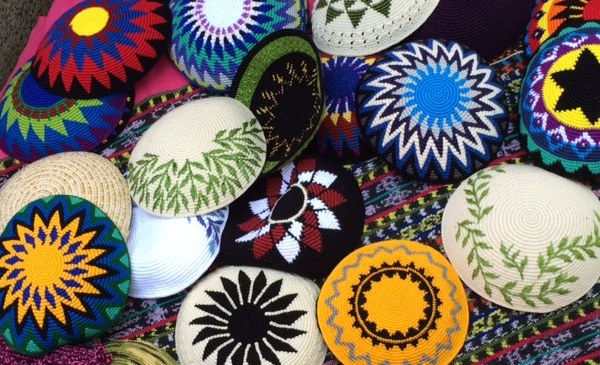
My Fair Trade Lady: A Trip to Guatemala to Meet Judaica Creators
That is what brought us to Guatemala, home of rich textile traditions and an abundance of highly skilled female artisans barely able to support themselves. Sheer abundance drives down prices. We met with artisan groups in remote places who, through liaisons, create Judaica. This affords them access to a niche market.
Not only were their kippot, tallitot, and other items a treat for the eyes, we were able to see the impact of Fair Trade up close. The women have improved their modest homes. Their children are all in school, with many continuing on to college. Quite a few artisans—surprisingly—were proudly single. We learned that their increased income has allowed them to postpone marrying and be more selective about mates. One weaver, because of her increased income from weaving tallitot, left an abusive marriage.

Mayaworks Kippot. Photo by Betsy Teutsch.
Mayaworks sells over 7,000 kippot a year—that adds up. MayanHands, headed by Guatemalan-American anthropologist Brenda Rosenbaum, likewise sells beautiful challah covers, matzah covers, and kippot.
One highlight was sharing our ideas with the artisans. We saw stacks of brightly colored square bread baskets made of gorgeous Guatemalan fabric in the famous Chichicastenango market. Hello, matzah holders! Look for them next year; the weavers are busy adding them to their Judaica offerings. Our ritual bread of affliction will be beautified by women’s economic empowerment.
Betsy Teutsch is on the Advisory Board of Fair Trade Judaica, a Judaica designer, and the author of 100 Under $100: Tools for Empowering Global Women.



